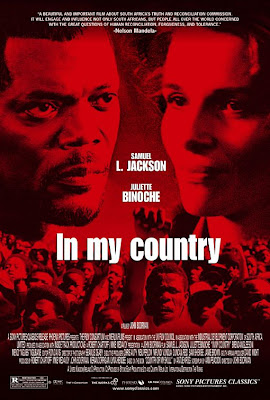 (Movie Review)
(Movie Review)There are a lot of great movies about the South African struggle. I've seen "Gandhi" several times. I loved "The Power of one" and "Cry Freedom". But I suspect I'm not the only one who sees a video about Apartheid in the video store and thinks: Do I really feel like being preached to tonight? I mean I already get it, Apartheid is bad.
(Quick sidenote: South Africa is a participating country in the JET program, and consequently I've met several South Africans here during my time in Japan. Among other people, Mike, who was my partner and crime in as the only other foreigner in Ajimu for a year, was from South Africa. Although I should have known better, because of the movies I had seen somewhere in my subconscious I expected all South Africans to be either demons or saints, either dripping with racism or overflowing with a passion for justice, constantly teaching me life lessons and speaking in proverbs. Needless to say, they turned out to be just ordinary people. We had some interesting discussions, but no one seemed to have emerged battle scared or traumatized from their Apartheid era childhood.)
The good news about this film is that, in comparison to the other Apartheid films I've seen, it offers a fresh take. It takes place during the Truth and Reconciliation commission hearings after the fall of Apartheid in 1994. During these hearings anyone who had committed atrocities during the apartheid era could make a full confession receive amnesty provided they had only been following orders.
As such, the film offers a whole new set of issues to explore. Not simply "Let's all agree on how awful apartheid is", but also what is the best way for a society to move forward after the nightmare is over? What is more important for society, justice or reconciliation?
The bad news is that the film never manages to rise to the bar it has set for itself. As is often the case with these historical films, the fictional characters and story the film makers have created don't do justice to the real history. We get a glimpse of the complexity of issues under discussion at these hearings, but then the story veers away to the personal lives of white South African Anna Malan (Juliette Binoche) and cynical American journalist Langston Whitfield ( Samuel L. Jackson) and the unlikely Romance that develops between them. This would have been a much better movie if it had stayed more focused on the actual historical events, and skipped the Hollywood love story.
It's not a bad movie, but it's one of those movies that flirts with genius, and then drops the ball, and you feel the disappointment bitterly. It is apparently based on a non-fiction book, "The Country of my Skull" which is supposed to be much better.
Link of the Day
I don't link to Tom Tomorrow cartoons as often as I should. But this one here This Modern World: Convenient conclusions shows him at his usual brilliance.
In My Country: Movie Review (Scripted)
No comments:
Post a Comment